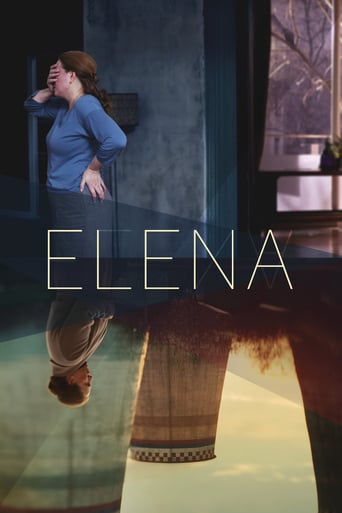Lee Eisenberg
Andrey Zvyagintsev's "Elena" is a not a pretty picture of modern Russia. One can see a stark contrast between the life of affluent life that the protagonist and her husband lead and the miserable life that her son leads. The gang that beats up a homeless man adds to the dismal factor. It's no accident that Elena does what she does towards the end.Many of the shots last a couple of minutes each, creating a sense of realism. By all accounts, most of the characters see no future. Like Zvyagintsev's previous movie "The Return", it's a focus on a grim, unforgiving world (his more recent "Leviathan" focused on the same sort of topic but also incorporated corruption in the story). The residences alone show the difference: Elena and Vladimir live in a swanky loft, while her son lives in a crumbling apartment building (one of those Khrushchev-era edifices that had design problems from the start).I recommend the movie. Along with the main plot, it poses the question: can Russia ever see a future?
FilmCriticLalitRao
It would not be an understatement at all if some knowledgeable film critics were to state that Russians are the world's best filmmakers in contemporary times. The current crop of Russian films have not only managed to convey valuable messages about life and its significance but have also been successful in entertaining astute audiences all over the world. "Elena" is a brilliant example of an ethical film with a message. In many ways, it has already been hailed as one of Andrei Zvyagintsev's most accessible films. It is a film which is absolutely devoid of symbolism with which one would normally associate most films made by Zvyagintsev. Elena succeeds as it is an honest film about how money and the acquisition of money has influenced the way Russian society looks at life. A fine balance has been struck as this film shows two aspects of modern Russia : on the one hand, a Russia where a certain section of rich people live in beautiful houses and enjoy all the best facilities to maintain a good lifestyle. On the other hand, there is a different facet of a troubled Russia where alcoholism and bad housing conditions have made life miserable for poor denizens. How does one fit in today's affluent Russia of two extremes where not having money was a colossal problem in the past and having more money has also become a major modern problem ? This is an apt description which can be attached to Russian film "Elena". Although slow in parts, Elena gains momentum in the later part of second half which is the most crucial segment of the film in terms of action. However, the beauty of this film lies in the manner some of life's challenging questions related to economic well being of ordinary people have been asked. It is for finding answers to such questions that Elena must be watched by anybody interested in the manner in which financial health of a person influences his/her personal health.
paul2001sw-1
Andrey Zvyagintsev 's 'The Return' is my favourite film to date of the 21st century. 'Elena', a personal drama that illuminates the class structure in contemporary Russia, is not quite so powerful – it's very slow, and the ambiguity of motive that drove the earlier film is not there. And on first viewing it wasn't clear to me whether the shocking but strangely ambivalent ending is a work of genius or the sign of a film that has lost its focus. Still, the director's ability to construct haunting, unexpected images has not deserted him; some scenes reminded me of Keislowski in his Polish phase, just about the highest praise I can give.
palmiro
The director presents a fable or allegory of the condition of Russia, pointing above all to the devastating vestiges of serfdom, an institution that was ended 150 years ago (at the same historical moment as slavery in the U.S.) but continues to shape the mentalities of the masses rendering them greedy, violent, lazy, cunning, underhanded, and superstitious (for their "piety" and "faith" have nothing in common with a code of morals, only with the practice of magic). Drink is their main source of entertainment, and their affect and entire way of being remain primitive. They are loyal at most to their clan and to the local "band of brothers," but show no signs of civic-mindedness or a connection to a larger collectivity (community, class, nation, profession, etc.--all of which are essentially absent as social forces) They resist the dominant strata by means of the "resistance of the weak"--outward silence and acquiescence combined with subterfuges and covert acts of violence. This wretched subaltern class has a matching dominant class: greedy, hedonistic, lazy, and lacking in compassion. Because of the long-term effects of serfdom, Russia has failed to produce hegemonic classes, neither a hegemonic bourgeoisie nor a hegemonic proletariat. A social formation based on serfdom as the central relation of production cannot produce legitimate ruling classes or modern forms of consciousness and action. (written by R.Garner)



